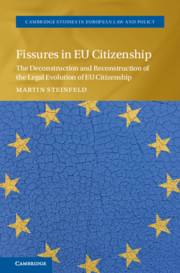 Fissures in EU Citizenship
Fissures in EU Citizenship from Part I - Fissures in the Foundations of the Temple
Published online by Cambridge University Press: 11 January 2022
If Chapter 1 can be understood as the incipient citizen being partially seen through the social construction of the worker, then, because its ‘final form’ was well defined in a discursive sense, understanding it is relatively straightforward. This chapter, by contrast, focusses on the complex, the contingent and, ultimately, the controversial. More specifically, it constitutes a nuanced and qualitative attempt to examine strands which, weaved together, partially constitute Union citizenship n a contemporary and contextual sense but yet is also a chapter that further illustrates a series of fissures within its very foundations. What was outlined in Chapter 1 was a rather large fissure that had formed in relation to the very essence of the ‘Community worker’ from the outset. What remained unresolved (particularly after the development in Levin/Lawrie-Blum) was where those who simply could not be classified as workers conceptually fit within the framework of free movement of persons law. Today, EU Citizens derive protection whether explicitly economically active or within socially excluded categories of individuals or not.
To save this book to your Kindle, first ensure [email protected] is added to your Approved Personal Document E-mail List under your Personal Document Settings on the Manage Your Content and Devices page of your Amazon account. Then enter the ‘name’ part of your Kindle email address below. Find out more about saving to your Kindle.
Note you can select to save to either the @free.kindle.com or @kindle.com variations. ‘@free.kindle.com’ emails are free but can only be saved to your device when it is connected to wi-fi. ‘@kindle.com’ emails can be delivered even when you are not connected to wi-fi, but note that service fees apply.
Find out more about the Kindle Personal Document Service.
To save content items to your account, please confirm that you agree to abide by our usage policies. If this is the first time you use this feature, you will be asked to authorise Cambridge Core to connect with your account. Find out more about saving content to Dropbox.
To save content items to your account, please confirm that you agree to abide by our usage policies. If this is the first time you use this feature, you will be asked to authorise Cambridge Core to connect with your account. Find out more about saving content to Google Drive.